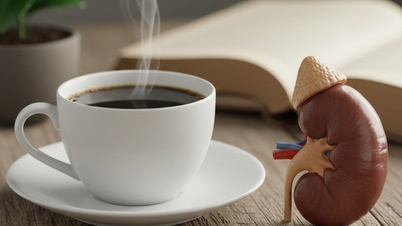Drinking coffee at or near the time of taking certain common medications can alter how the body absorbs, eliminates, or reacts to the drug. This can result in reduced effectiveness of the medication and even increased risk of side effects, according to the US health website Verywell Health .

Some medications should be taken with coffee in moderation.
ILLUSTRATIVE PHOTO: AI
Here are some common medications that patients should avoid combining with coffee:
Sensor car
Many cold and flu medications, especially over-the-counter (OTC) versions, contain stimulants like pseudoephedrine or phenylephrine to relieve nasal congestion. When combined with caffeine in coffee, these can increase the stimulating effects on heart rate and blood pressure, causing tremors, nervousness, anxiety, and even irregular heartbeat.
Additionally, because caffeine has a mild diuretic effect, it can increase dehydration. This is especially important when you have a cold or flu, when your body needs to maintain its water balance.
Cardiovascular medication
For cardiovascular medications such as beta-blockers, calcium channel blockers, and diuretics, coffee can affect them in various ways. For example, caffeine can temporarily increase blood pressure and heart rate due to stimulation of the sympathetic nervous system. This effect is the opposite of the goal of blood pressure-lowering medication.
Some studies suggest that coffee may alter the absorption or metabolism of cardiovascular medications. If you are taking cardiovascular medication, discuss with your doctor the ideal time to drink coffee. For example, you may need to take your medication before drinking coffee or space out the time between them.
Thyroid medication
Drinking coffee too close to the time of taking thyroid medication, such as levothyroxine, can significantly reduce drug absorption, possibly by as much as 30-40%. The main mechanism of interaction is that caffeine or other components in coffee alter stomach pH or compete for absorption in the intestines, preventing the thyroid medication from being absorbed effectively.
Therefore, many doctors recommend that people taking thyroid medication take it on an empty stomach, then wait at least 30-60 minutes before drinking coffee or eating anything else. Those who habitually drink coffee in the morning should take their thyroid medication at least one hour after drinking coffee.
Antidepressants
Coffee and some antidepressants can interact through various mechanisms. Specifically, some antidepressants are metabolized by liver enzymes that also process caffeine. When coexisting, the drug and caffeine sometimes compete for these enzymes, potentially leading to increased levels of either the drug or caffeine in the blood, causing symptoms such as nervousness, tremors, and anxiety.
Additionally, coffee contains tannins, which can bind to and reduce the absorption of antidepressants. When consumed together, caffeine can amplify some of the side effects of antidepressants, such as insomnia, restlessness, and rapid heartbeat.
Analgesic
Coffee can interact with pain relievers such as paracetamol, ibuprofen, and naproxen. In some cases, caffeine is actually used in combination pain medications to enhance their pain-relieving effects.
However, drinking coffee along with painkillers can increase nervous system stimulation or cause cardiovascular stress, especially in sensitive individuals, according to Verywell Health .
Source: https://thanhnien.vn/5-loai-thuoc-nen-han-che-uong-chung-voi-ca-phe-185251010200223237.htm



![[Photo] Two flights successfully landed and took off at Long Thanh Airport.](/_next/image?url=https%3A%2F%2Fvphoto.vietnam.vn%2Fthumb%2F1200x675%2Fvietnam%2Fresource%2FIMAGE%2F2025%2F12%2F15%2F1765808718882_ndo_br_img-8897-resize-5807-jpg.webp&w=3840&q=75)








































































































Comment (0)